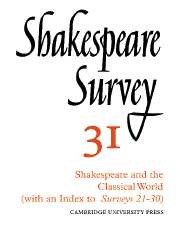Book contents
- Frontmatter
- The Ancient World in Shakespeare: Authenticity or Anachronism? A Retrospect
- ‘A Piece of Skilful Painting’ in Shakespeare’s Lucrece
- Philomel in Titus Andronicus and Cymbeline
- Apuleius and the Bradleian Tragedies
- ‘The Choice of Hercules’ in Antony and Cleopatra
- Structure, Inversion, and Game in Shakespeare’s Classical World
- Truth and utterance in The Winter’s Tale
- Adumbrations of The Tempest in A Midsummer Night’s Dream
- The Old Honor and the New Courtesy: 1 Henry IV
- Henry V: the Chorus and The Audience
- ‘The Devil’s Party’: Virtues and Vices in Measure for Measure
- Shakespeare and the Healing Power of Deceit
- Shakespeare’s Man Descending a Staircase: Sonnets 126 to 154
- A New View of Bankside
- Comedies and Histories at Two Stratfords, 1977
- Tamburlaine the Great Re-discovered
- The Year's Contributions to Shakespearian Study 1 Critical Studies
- 2 Shakespeare’s Life, Times, and Stage
- 3 Textual Studies
- General Index to Surveys 22–30
- Index
- Plate Section
Philomel in Titus Andronicus and Cymbeline
Published online by Cambridge University Press: 28 March 2007
- Frontmatter
- The Ancient World in Shakespeare: Authenticity or Anachronism? A Retrospect
- ‘A Piece of Skilful Painting’ in Shakespeare’s Lucrece
- Philomel in Titus Andronicus and Cymbeline
- Apuleius and the Bradleian Tragedies
- ‘The Choice of Hercules’ in Antony and Cleopatra
- Structure, Inversion, and Game in Shakespeare’s Classical World
- Truth and utterance in The Winter’s Tale
- Adumbrations of The Tempest in A Midsummer Night’s Dream
- The Old Honor and the New Courtesy: 1 Henry IV
- Henry V: the Chorus and The Audience
- ‘The Devil’s Party’: Virtues and Vices in Measure for Measure
- Shakespeare and the Healing Power of Deceit
- Shakespeare’s Man Descending a Staircase: Sonnets 126 to 154
- A New View of Bankside
- Comedies and Histories at Two Stratfords, 1977
- Tamburlaine the Great Re-discovered
- The Year's Contributions to Shakespearian Study 1 Critical Studies
- 2 Shakespeare’s Life, Times, and Stage
- 3 Textual Studies
- General Index to Surveys 22–30
- Index
- Plate Section
Summary
The dream’s here still. Even when I wake it is / Without me, as within me; not imagin’d, felt. / A headless man? The garments of Posthumus? / I know the shape of’s leg; this is his hand, / His foot Mercurial, his Martial thigh, / The brawns of Hercules; but his Jovial face – / Murder in heaven? How? ’Tis gone.
(IV, ii, 307–13)Thus Imogen, half way through what must be one of the most difficult speeches for an actress to deliver in the entire Shakespearian canon, described by Shaw as 'that nice Elizabethan morsel of the woman waking up in the arms of a headless corpse'. The horror of the situation might be sufficient in itself to provide a challenge for most dramatists, but Shakespeare has chosen to complicate it further by giving Imogen a long and detailed speech, reminiscent not only of Hamlet's eulogy on his father but also of Thisbe's comic lamentations on discovering the body of Pyramus. This speech can have the effect of diminishing our sympathy for her, especially as her identification of the body by such precise details is in fact mistaken. Granville-Barker goes so far as to say that what Shakespeare is doing here is ‘ dramatically inexcusable’; certainly it must seem perverse and strange to most people bold enough to produce the play.
- Type
- Chapter
- Information
- Shakespeare Survey , pp. 23 - 32Publisher: Cambridge University PressPrint publication year: 1979

